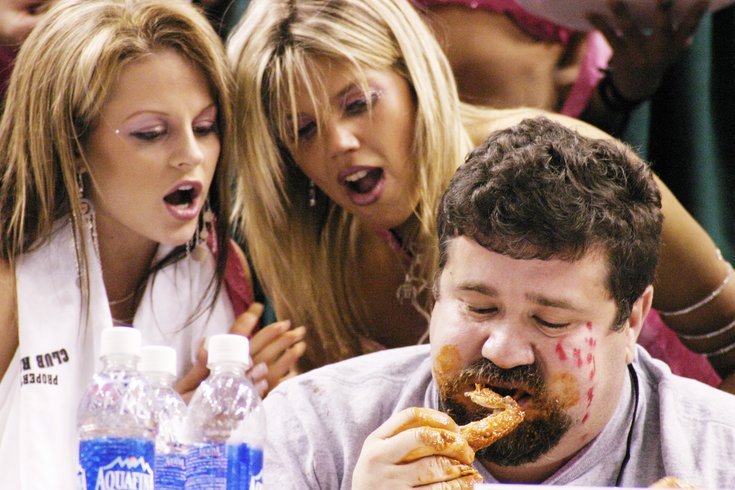
October 30, 2024
 Provided image/Pat Taggart
Provided image/Pat Taggart
Wing Bowl, the WIP chicken-eating contest that ran from 1993 to 2018, is the subject of the documentary 'No One Died.' The image above is a still from the movie, which played at the Philadelphia Film Festival.
Long before he documented the Wing Bowl, the former WIP chicken wing-eating competition that drew thousands, filmmaker Pat Taggart lived it.
"My friend's uncle got in as an eater one year, and he needed people in his entourage," Taggart recalled. "His name was Ali Blaba. They were a family of butchers, so they put an actual real cow's carcass over his head. And he laid on this platform and we carried him in.
"He was not memorable as an eater, but he certainly made a memorable entrance."
Eye-popping details like these appear constantly in Taggart's documentary "No One Died: The Wing Bowl Story." The film, which recently screened at the Philadelphia Film Festival, follows the radio contest from its humble beginnings in a hotel to its climatic 26th year in the Wells Fargo Center, two days before the Eagles won their first Super Bowl. That victory effectively ended the Wing Bowl, long billed as an outlet for frustrated Philadelphia fans with no hope of a championship.
When it was still alive, however, there was nothing quite like Wing Bowl. The competition didn't just boast crowds or astonishing numbers — Molly Schuyler ate 501 wings in the final contest — but plenty of Philly flavor. Local entrants adopted personas akin to professional wrestling characters, complete with wigs, face paint and floats for their procession.
"For the most part, the people that were in it were people in our city and not famous people, but people driving buses and working at tolls, you know, blue collar jobs," Taggart said. "And these people for one day could be heroes. That's what I thought was always really cool about it."
While professional eaters like Joey Chestnut did take home Wing Bowl titles, the hometown heroes feature prominently in the documentary. Champions like Jonathan "Super" Squibb and Eric "Gentleman E" Behl sat for interviews, as did five-time winner Bill Simmons, aka El Wingador. Memorable figures who did not claim a crown also figure into the story. Matt "Sloth" Dutton, whose projectile vomiting disqualified him from the 2001 Wing Bowl, gets a segment. So does Mize, the half-time entertainer who smashed full beer cans into his forehead until they exploded — and he bled.
Taggart came to the Wing Bowl story after making another documentary about a radio contest. That film was "Billboard Boys," which chronicles the 261 days three men spent on an Allentown billboard platform to win a mobile home. It caught the attention of longtime WIP and Wing Bowl host Angelo Cataldi, who suggested Taggart tackle the eating competition next.
The director eventually collected 20 hours of interview footage with 40 subjects including Cataldi, along with countless clips of Wing Bowl contests crowdsourced from the people who attended. (WIP, according to Taggart, refused to shared its videos.) Add in thousands of photos and you have a comprehensive snapshot of the fabled event. But not all of it is flattering.
The raunchiness of Wing Bowl, which ratcheted up as the event exploded, made it a polarizing tradition. Scantily clad women known as "Wingettes" hyped the contestants and counted the discarded chicken bones each year. Many were dancers at local strip clubs, which received considerable business from revelers leaving the contest. At a film festival Q&A following the Saturday showing of "No One Died," a man who claimed to be a strip club owner thanked Wing Bowl "for the best day of the year, every year."
But it was really the spectators, not the sex workers, who lent the Wing Bowl a bad reputation. Especially in its later years, Wing Bowl received negative attention for its overly intoxicated audience. Fistfights were common, as were flashes of nudity, despite the event's 6 a.m. start time on a Friday.
"You really had to paint a full picture of what this was," Taggart said. "And I often say, show enough of the raciness or the ugliness of it without going overboard, just so people got a feel for what it was. Because otherwise, if we just painted this as like this like goofy, funny contest without the excessive drinking, without the fights, without the nudity and all that, then you're not doing it justice."
Taggart and his producer Frank Petka are hoping to bring the Wing Bowl story to a streaming service, but "No One Died" does not have a distributor yet. While the documentary is extremely Philly, its director believes there's something universal in the wild story. He's also hopeful that audiences are hungry for a different kind of documentary.
"I think that people are really excited to watch a film that's something other than true crime," he said. "Because if you go to Netflix right now, for example, it's a ton of true crime. In almost everything that you watch, someone dies. And so there is a little irony in the title of this film. Like, hey, not a true crime doc.
"Ultimately we think that when people watch it, they should leave it smiling. And I think that was the takeaway from the festival was that people left smiling. The best compliment was paid by Angelo Cataldi. He said, I got one of the greatest gifts of my life from Frank Petka and Pat Taggart, because I love Wing Bowl again."
Follow Kristin & PhillyVoice on Twitter: @kristin_hunt
| @thePhillyVoice
Like us on Facebook: PhillyVoice
Have a news tip? Let us know.